Podcast: Play in new window | Download
Subscribe: Apple Podcasts | Spotify | Amazon Music | Android | iHeartRadio | TuneIn | RSS | More

In this episode, we perceive an act of forgiveness, as depicted in Sangam Literary work, Kurunthogai 49, penned by Ammoovanaar. The verse is situated in the coastal regions of ‘Neythal’ and speaks in the voice of the lady to the man, conveying her acceptance of him, when he returns to her after being with the courtesan.
அணிற் பல் அன்ன கொங்கு முதிர் முண்டகத்து
மணிக் கேழ் அன்ன மா நீர்ச் சேர்ப்ப!
இம்மை மாறி மறுமை ஆயினும்.
நீ ஆகியர் எம் கணவனை;
யான் ஆகியர் நின் நெஞ்சு நேர்பவளே.
‘You are mine; And, I’m yours’ reverberates in this one! A striking simile opens the verse in ‘அணிற் பல் அன்ன’ meaning ‘akin to a squirrel’s teeth’. Then, there’s mention of ‘கொங்கு முதிர் முண்டகம்’ referring to ‘the honey-rich flowers of the water-thorn plant’, found abundantly on seashores. In current-day Tamil, this blue flower called as ‘neermulli’ and is said to have a plethora of medicinal benefits. Speaking of blue, there appears ‘மணிக் கேழ்’ meaning ‘hue of sapphires’. The phrase ‘இம்மை மாறி மறுமை’, which is said to appear in the meaning of ‘this life changing to the next’, seems to hint at a belief of many births held by the Sangam folks. Relationships make their presence felt in ‘எம் கணவனை’ meaning ‘my husband’. Ending with the words ‘நின் நெஞ்சு நேர்பவளே’ meaning ‘she, who your heart covets’, the verse intrigues us to listen closely.
Squirrel teeth, honeyed flowers and afterlife sounds like a heady combination! The context reveals that the man and lady had been leading a married life when the man left the lady to seek the company of courtesans. After a while, he realises the error in his ways and returns home to the lady. One night, when she is with her man, the lady says, “O lord of the seas, which have the hue of sapphires, and shores of honey-filled ‘mundakam’ flowers with thorns akin to a squirrel’s teeth! Even if this life were to transition to the next, you shall be my husband; And, I shall be the one your heart desires!” With these words, the lady subtly relays how the man has hurt her with his actions, but while that may be, she adds that she wishes togetherness for them both forever!
All we heard was a description of the seashore! Where could the lady have hidden her admonishment of the man’s behaviour? Let us playback her words and follow them closely. The lady describes the man as the ruler of the great seas, which she says are in the colour of sapphires, and then, she turns to talk about the bordering shore and here, she points to the spreading ‘neermulli’ flowers, dripping with honey, and also, having thorns that look like a squirrel’s teeth. If you happen to live in Asia or Africa, when you take a walk by the shore, or a trek through marshlands, watch out for this bright blue ‘neermulli’ flower, with sharp thorns sticking out on all sides. In my imagination, a squirrel’s teeth had flat edges and I was finding it difficult to reconcile that with this comparison of a neermulli’s thorn. Only when I searched for images of a squirrel’s teeth, I found that these had the exact same pointed ends, like the thorns of the ‘neermulli’ plant mentioned here. And, I came away awed by the powers of observation of our ancestors!
Returning to the verse, the lady has described the man’s land in her address to him. Could there be more to this description? Before we get there, let’s listen to what the lady says. Turning away from such realistic elements in the man’s land, the lady wishes that even if that life were to change to the next, the man should be her husband and that she should be the one, who his heart wants to be with. Now is the time to return to that description of the shoreline! In talking about the thorns of the honey-rich ‘neermulli’ flowers, the lady illustrates how the man has hurt her with his actions of seeking courtesans. However, inspite of the thorns, akin to the plant’s honey-rich flowers, the man had a heart full of love for the lady and that’s why she wishes for him to be her husband forever. Even as she finishes, she doesn’t wish for herself to be merely his wife but specifically, as the one his heart desires, and in that, perhaps, she wishes, in another life, the man would not desire the company of courtesans and prefer her for eternity. With its nuanced expression, the verse reveals the layers in the art of acceptance and healing.




Share your thoughts...